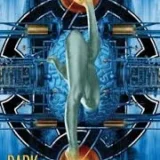 He’s back!
He’s back!
Pope Emeritus Benedict XVI.
I’m so thrilled! Not that I don’t love Pope Francis, of course. But I have a special affection for Benedict that has been deepened by this latest tidbit of news. The pope emeritus has written a letter to prominent Italian atheist Piergiorgio Odifreddi, rebutting Odifreddi’s critique of Benedict’s theology. And in it he displays an appreciation for science fiction.
I am absolutely slavering to read the whole thing, but only excerpts have been published, and only bits of those have been translated from the Italian by news agencies. Come on, Holy See, give us an official translation! However, a pseudonymous priest-blogger in Atlanta has heroically translated all the Italian excerpts that are available and put them online. Here is the bit I especially want to share with you, as translated by Fr. “Gashwin Gomes”:
Science fiction exists, on the other hand, in the ambit of many sciences. That which you explain about theories concerning the beginning and the end of the world in Heisenberg, Schrödinger, etc., I would designate as science fiction in the good sense of that phrase: they are visions and anticipations, in order to reach a true knowledge, but they are also, precisely, only imaginations with which we seek to come close to reality. There indeed exists, science fiction in a grand style, for instance, within the theory of evolution. The “selfish gene” of Richard Dawkins is a classic example of science fiction.
Let’s dig into Benedict’s definition of science fiction here. Note that Odifreddi had dismissed the former pope’s theology as “science fiction” in the book of criticism to which Benedict is here responding. While I haven’t (and, sob! it’s in Italian, so I can’t) read Odifreddi’s book, I am guessing that he used the phrase “science fiction” in the perjorative sense we are all too familiar with, as a way to dismiss a idea one doesn’t like. Benedict’s definition, by contrast, is disarmingly precise. “Visions and anticipations … by which we seek to come close to reality,” using our imaginations.
Hmm! That reminds me of something our heroic editor here at Amazing Stories, Steve Davidson, wrote a while back:
[Science fiction is] an on-going process of modeling mankind’s possible futures, the ways in which our technologies can and will affect us, an examination of our ethics and moralities and their suitability for the future, a scouting expedition into places both dark and light, a report back on the road conditions ahead.
Benedict points out that science fiction is a way for us to gain a better understanding of our now, our yesterdays, and our tomorrows. Steve has zeroed in on tomorrow, but this is obviously just one part—the prophetic part—of the role science fiction plays in our world, as Benedict has reminded us. Steve’s piece—really, if you haven’t read it, do—repeatedly invokes the concept of modeling. Writers are modeling potential futures. While Benedict doesn’t use the word modeling in the available excerpts of the Odifreddi letter, he clearly implies it when he points out that scientific theories are “only imaginations,” that is, models of reality, fictions built on an armature of facts.
The writer and the scientific theorist are playing the same game, using their imaginations.

Now obviously Benedict is discussing science fiction as a descriptive genre as represented by Dawkins and Jacques Monad, who write about the past and present. Writers who envision future realities tend to be prescriptive or, its opposite, proscriptive. Their models are manuals for the future, to borrow Steve’s phrase: either How To, or How To Not. This is a significant difference, and it’s the reason that Baxter and Robinson get shelved in the fiction section, while Dawkins et al. get the “non-fiction” imprimatur and spendy end-cap displays in the bookshop. But it’s a difference of style, not substance. All these writers, in the end, are talking to us about ourselves, inviting us to “come closer to reality” by the exercise of the imagination.
Erm. If you were expecting a review of The Selfish Gene, sorry! I’ve not actually read it. But it’s clear that Benedict has. And his description of it as “classic science fiction” is, I believe, a compliment. PEBXVI doesn’t do sarcasm. Moreover, the context removes any possibility that this was a glib dismissal of Dawkins’s work. Benedict is bracketing it with the theories of Heisenberg and Schrödinger as examples of “science fiction in the good sense.” He has found something to admire, something useful, something insightful in The Selfish Gene.
So I may just have to get over myself and read it, too. After all … I love science fiction.
***











I’ve been wrestling with this “science fiction isn’t predictive” issue for quite some time, slowly coming around to defining why those who say so are WRONG!!! (lol) and explaining why they are wrong. I’ve long held the belief that it has more to do with semantics and definitions than any real lack of prediction going on in the genre.
I’ve now settled on the word “forecasting”; gropings towards that are in the piece you linked to. SF authors who intentionally engage in modelling a possible future are NOT being “predictive” in the sense of “this will happen in 2927”. They are forecasting the results of a set of starting assumptions. Change those beginning assumptions and the forecast will change accordingly. Fail to include all of the important initial states and the forecast will be off. (Climate modelling was terribly bad until recently – no one was including the effect of roads and buildings in cities as heat sinks/sources).
So forecasting is the word I’m going to be using from now on; I think its the correct word for what’s actually going on (when the author IS intentionally modeling ‘A’ future – not so much when entertainment is the primary focus) and it avoids that whole association with palm readers and such.